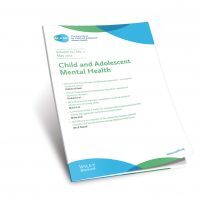ACAMH Website Content Types
-

Stratifying early-onset emotional disorders: using genetics to assess persistence in young people of European and South Asian ancestry
Open Access paper from the JCPP – ‘We examined whether psychiatric polygenic scores (PGS) could help inform stratification efforts to predict those at higher risk of recurrence’. Charlotte A. Dennison et al.
Read more -

DNA methylation at birth and lateral ventricular volume in childhood: a neuroimaging epigenetics study
Open Access paper from the JCPP – ‘In this study, we conducted the first epigenome-wide association study of neonatal DNAm in cord blood with LVV in childhood (measured using T1-weighted brain scans at 10 years), based on data from a large population-based birth cohort, the Generation R Study (N = 840)’. Mannan Luo et al.
Read more -

The influence of loss to follow-up in autism screening research: Taking stock and moving forward
Open Access paper from the JCPP – ‘How best to improve the early detection of autism spectrum disorder (ASD) is the subject of significant controversy. Some argue that universal ASD screeners are highly accurate, whereas others argue that evidence for this claim is insufficient. Relatedly, there is no clear consensus as to the optimal role of screening for making referral decisions for evaluation and treatment.’ R. Christopher Sheldrick et al.
Read more -

Review: Adverse event monitoring and reporting in studies of pediatric psychosocial interventions: a systematic review
Open Access paper from the CAMH journal – ‘In this systematic review, we identified how adverse events are defined, measured, and reported in studies of psychosocial interventions for children with mental disorders’. Kalee Lodewyk et al.
Read more -

4STMF (Four Steps To My Future): acceptability, feasibility and exploratory outcomes of a universal school-based mental health and well-being programme, delivered to young adolescents in South Africa
Open Access paper from the CAMH journal – ‘Mental health disorders affect many children in South Africa, where vulnerability is high, and treatment is limited. We sought to determine the feasibility and acceptability of a universally delivered classroom-based programme for the promotion of mental health in young adolescents.’ Bronwynè Coetzee (pic) et al.
Read more -

Debate: Neurodiversity, autism and healthcare
Open Access paper from the CAMH journal – ‘I discuss current different uses of the term autism, the relation to intellectual disability, and introduce a conceptualisation of autism as emergent and transactional, which is consistent with current developmental and intervention science. This could bridge between neurodiversity and clinical perspectives and implies a framing of early intervention support that has strong clinical trials evidence and provides the basis for a rational and pre-emptive evidenced care pathway, which I describe.’ Jonathan Green (pic).
Read more -

Annual Research Review: Early intervention viewed through the lens of developmental neuroscience
Open Access paper from the JCPP – ‘The overarching goal of this paper is to examine the efficacy of early intervention when viewed through the lens of developmental neuroscience. […] We conclude our article by discussing the implications our review has for policy, and we then offer recommendations for future research’. Charles A. Nelson et al.
Read more -

JCPP Editorial: Volume 64, Issue 07, July 2023
Editorial: “What’s in a name? Drawing on the examples of autism and schizophrenia, some reflections on diagnostic labels and their future role in child and adolescent psychiatry” by Angelica Ronald
Read more -

The role of sleep in prospective associations between parent reported youth screen media activity and behavioral health
Paper from the CAMH journal – ‘We examined whether sleep mediated the association between screen media activity and youth behavioral health among a community sample’. Darlynn M. Rojo-Wissar (pic) et al.
Read more -

Technology Matters: Online, self-help single session interventions could expand current provision, improving early access to help for young people with depression symptoms, including minority groups
Open Access paper from the CAMH journal – ‘Current mental health service provision for young people was primarily designed based on an assumption of repeat attendance to enable access to interventions. This applies to in-person therapy and, in recent years, digitally provided apps and programmes. Yet, discontinuation after only one or two attendances or uses is a common problem. However, there is a different model, which is intentionally designing provision without assuming repeat attendance, that is, single session interventions.’ Maria E. Loades (pic) and Jessica L. Schleider
Read more